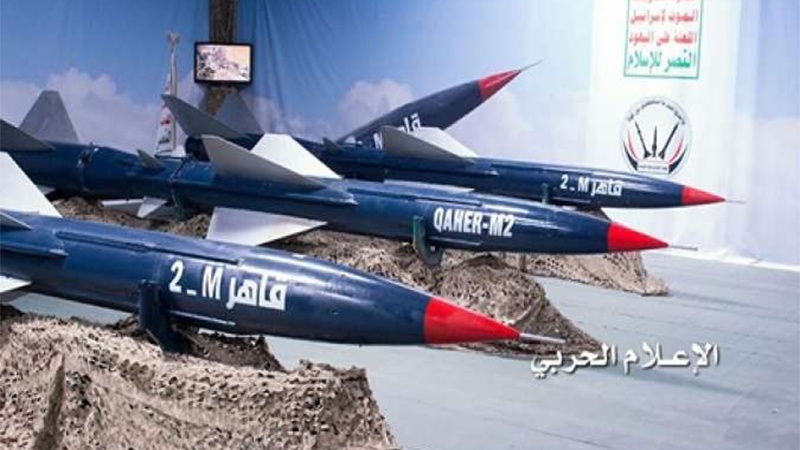Saudi Arabia in average of bankrupting due to Houthis ballistic missile
YemenExtra
Y.A
The Saudi-UAE unusual blackout on the aftermath of the strategic military options and their reflection on the economies of the Saudi-led coalition’s countries, in particular Saudi Arabia and the UAE. These countries that tried to turn a blind eye on these influences; thinking that they would achieve victory in Yemen as soon as possible, but they did not achieve it.
Supreme leader Sayyed Abdul-Malik al-Houthi has warned foreign investors and businessmen not to put their money in investments in these countries, as it is not safe, as long as the aggression against Yemen is still ongoing. Recent economic reports show how Yemeni missiles that recently targeted Riyadh foreign investments in Saudi Arabia were affected badly.
The latest speech of Yemen’s Supreme Leader on December 4, following the killing of the militias’ leader Ali Abdullah Saleh, Sayyed Abdulmalik Al Houthi renewed his warning to investors not to go to Saudi Arabia and the UAE, advising them to choose other countries which are stable to be invested in.
“We again recommend all countries that have investments in the United Arab Emirates and the Kingdom of Saudi Arabia they should bear in mind that these countries, as long as their policies are aggressive and as long as they persist in this aggression against our country [Yemen], then it is not the time of investment, these countries are not a safe economical environment and never prepared to be safe, even not suitable, so the investors should look for other countries to invest in such as Oman, East Asian countries, Iraq or in Syria, which are now moving toward security and stability, otherwise in Kuwait, for example, it is OK, but in Saudi Arabia or in the UAE, never ever, these countries are within the range of our ballistic missiles until they lift aggression.”, Said Sayyed Al Houthi.
This warning came after the Yemeni Missile Force fired a ballistic missile at Riyadh airport and another on a nuclear plant in the UAE capital. The ballistic missile was not yet fired at Al Yamamah Palace in the Saudi capital, which boosted the credibility of the leader’s warning and has badly reflected directly on the investment environment in Saudi Arabia.
In this context, the UK based Financial Times newspaper published a report focused on the possibility of implementing the economical and financial plans announced in Saudi Arabia in light of the internal and external problems that Saudi Arabia is facing.
“Between the detention of Saudi businessmen and Yemeni missiles, direct foreign investment in KSA will be more difficult, how will our investment be safe and secure? How do we deal with senior government officials? ”
The newspaper confirmed that “the military intervention in Yemen, provoked investors’ fears, especially after launching ballistic missiles on Riyadh.
The Kingdom of Saudi Arabia, which announced two weeks ago announced its budget for the next year with a deficit of over $ 54 billion, finds itself overwhelmed by a large financial drain on the defensive side, which is the largest Saudi figure of spending on the budget discounted from the expenditure on the economic projects and service.
Following the launch of a Burkan M-2 on Al Yamama Palace in the Saudi capital, which coincided with the announcement of the new budget, “Bloomberg” published a report entitled “Defense takes the largest share of the Saudi budget in light of the continuation of the war on Yemen.”
The agency pointed out that the war on Yemen does not show any signs of getting to succeed, and therefore Saudi Arabia found itself forced to spend its budgeton the defense side before any other side.
“The Saudi defense budget has increased for several reasons, most notably in the Middle East and in Yemen; the fact that Saudi Arabia and the UAE are participating in the war alliance against Yemen; and because of the recent arrival of Yemeni missiles to Riyadh.”, said John Sfakianax, head of economic research at the Gulf Research Centre.
He added “There is an international concern among investors especially when they hear Yemen rockets are buzzing over Riyadh”.
Another point, reported by Reuters, reveals the direct and rapid impact of the war on Yemen on the Saudi and UAE economies. On the fifth of this month, a day after Saleh was killed in Sanaa, the Saudi and UAE bourses declined sharply following the killing of the militia leader Saleh. Noting that the stock exchanges achieved a rise in the fourth of the same month after Saleh declared war in Sanaa, which caused optimism for investors to buy stocks; believing that such strife or civil war will succeed in achieving its objectives
Source : Website

